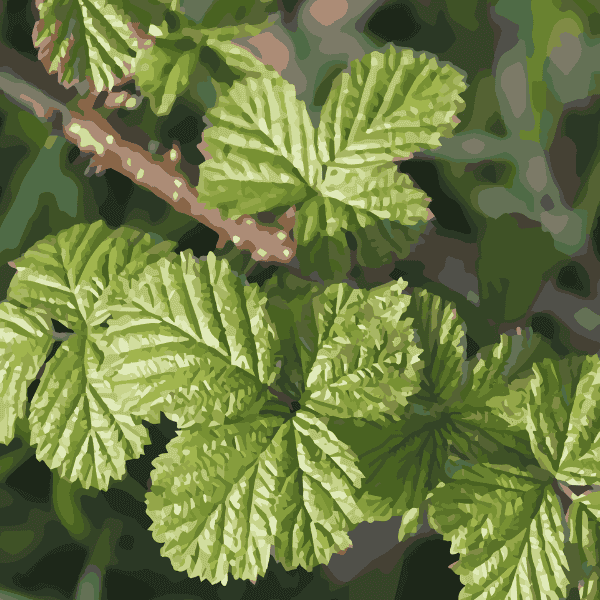
Blackberry Leaf {Organic}
Blackberry Leaf is found on the blackberry bush, which are known for their tasty berries. They are commonly found in teas and tinctures. The blackberry leaves may support gut health and may help digestion issues.
You might need blackberry leaf if . . .
Indigestion is something that a lot of people deal with. From boating and gas to diarrhea, after mealtime can become very uncomfortable for many. Our gut health contributes to our overall health, so getting your gut in check is important.
Turns out, blackberry bushes aren’t just for the delicious fruit they bare. The blackberry leaf has medicinal properties that support gut health! You might want to add blackberry leaf to your gut health support if you struggle with:
- Diarrhea
- Bloating
- Gas
- General indigestion
Benefits of Blackberry leaf
An everyday leaf of the blackberry bush has surprising benefits that can help support your digestion. This herb is gentle and can be used for kids and adults. Blackberry leaves contain tannins, which are compounds known for their astringent properties. Tannins may help to tighten and constrict tissues, potentially providing relief from diarrhea by reducing inflammation and irritation in the digestive tract. The leaves also have antioxidants like flavonoids and polyphenols, which may have anti-inflammatory effects. These antioxidants might help protect the gastrointestinal lining from damage caused by oxidative stress.
Common ways to use blackberry leaf
Tea: You can make a simple herbal tea with blackberry leaf by steeping 1 tsp of dried leaf in 8 ounces of boiling water for at least 10-15 minutes. You can sweeten it with raw honey to taste.
Tincture: Blackberry leaf is also consumed in tincture form. You can readily find them at health stores or online. They are also quite simple to make, although it takes about a month before the tincture is ready to be used. Find out how to make your own tincture here.
🌿Try making herbal extractions or this calm mood tea. ← 🟩 DIYs, recipes, and more!
Growing and Foraging Information
Blackberry leaf is extremely common in the US, so growing and foraging can be an affordable and easy way to use this herb.
The blackberry bush thrives in USDA hardiness zones 5 through 10. They prefer temperate climates with well-draining soil and full sun exposure. Plant blackberry bushes in early spring or late fall. Choose a sunny location with fertile, well-draining soil. Space bushes 3 to 5 feet apart. Water regularly, especially during dry spells, and provide support for the canes to climb.
Prune blackberry bushes in late winter or early spring to remove dead or diseased canes and promote new growth. Mulch around the base of the plants to retain moisture and suppress weeds. Blackberry leaves can be harvested once the bushes are established, typically in late spring or early summer. Choose young, tender leaves from healthy plants, avoiding those damaged by pests or disease.
If you're foraging for blackberry leaves, here’s what you need to know. Blackberry leaves are compound leaves with three to five oval-shaped leaflets arranged in an alternating pattern along a central stem. Each leaflet has serrated edges and a pointed tip. The leaves have a rough texture on the upper surface and a slightly fuzzy texture on the underside. Blackberry leaves are typically dark green in color. The leaves can be used fresh or dried for later use.
Safety Concerns
Blackberry leaf is a drying herb, and if too much is taken or if it is taken too often (cups and cups of tea or bottles of tincture), it may lead to constipation.
It is important to consider safety concerns in the context of history. Blackberry leaf is an herb that has been used by humans for hundreds of years. It is traced back to European history and being used to treat diabetes. You also must realize that many of the departments that bring up safety concerns, are responsible for managing pharmaceutical drugs that have been manufactured in recent history. In the United States, there is no controlling authority or regulatory board specific to herbs. The most common reason you will see that these organizations bring up to question the safety of various herbs is “insufficient evidence to determine safety.” Since there is no way to patent a naturally growing plant, there is often insufficient funding to conduct massive human studies.
Drug Interaction: If you have any health concerns or if you’re taking prescribed pharmaceuticals, consult your medical professional before taking blackberry leaf.
Breastfeeding and Pregnancy: There are no known contraindications for breastfeeding and pregnancy.
Other Concerns: Blackberry leaf is a gentle and effective herb. There are very few concerns. As with any food, there is a chance that someone could have an allergy to the plant itself, but this is extremely rare.
Select Studies About Blackberry Leaf
Rubus fruticosus (blackberry) use as an herbal medicine - PMC (nih.gov)
This article discusses the medicinal uses of blackberry leaf in history. Not only was it used historically to support digestive, but also as a mouth wash to help with mouth ulcers and spongy gums.
This study explores the properties of blackberry and red raspberry leaves including: bioactive compounds like vitamins, organic acids, phenolic acids, polyphenols, minerals, sugars, and dietary fiber.